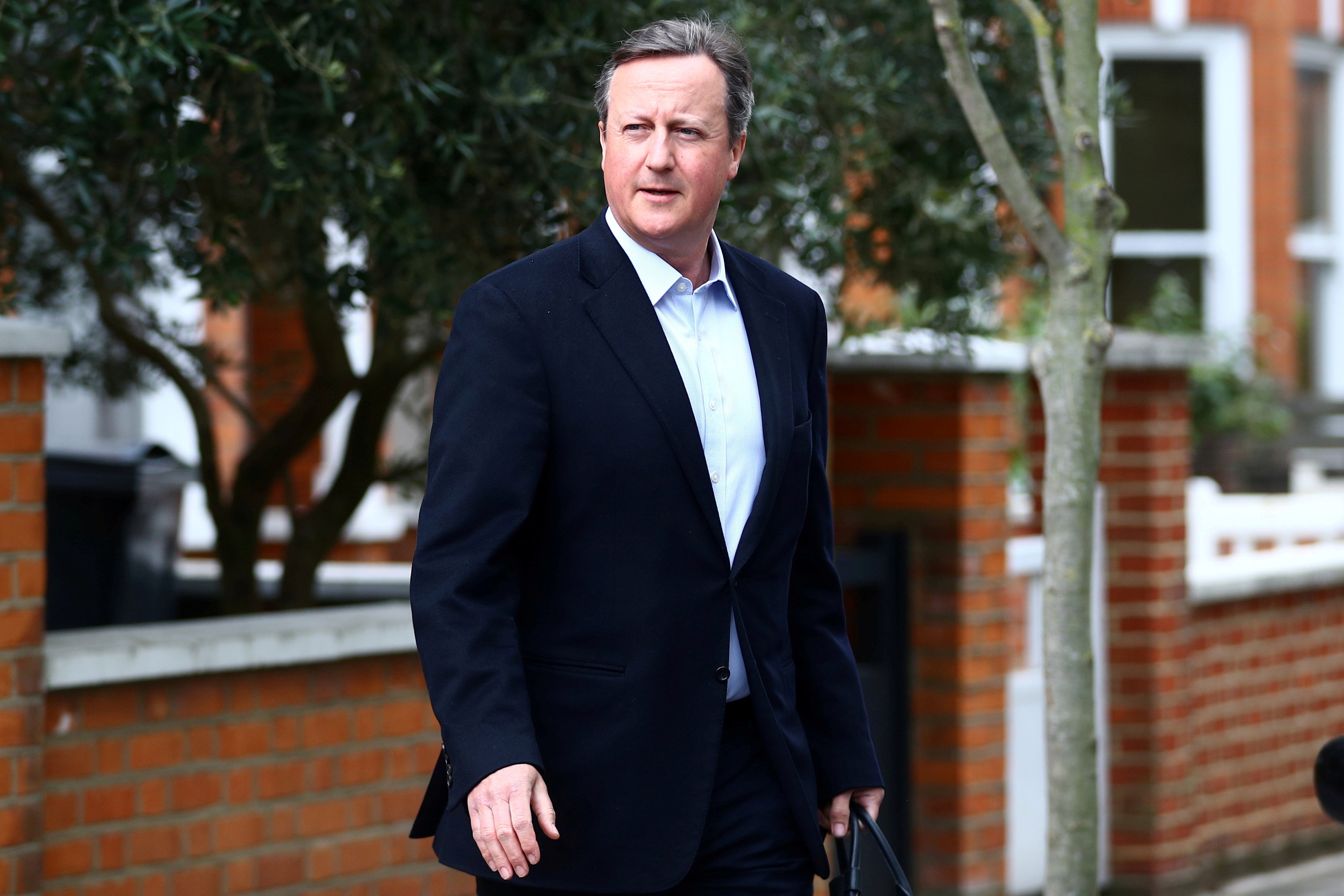Does David Cameron think we were born yesterday?
As David Cameron tries to wriggle out of lobbying allegations, there’s only one way to explain it, writes Chris Blackhurst


They must suppose we were born yesterday. How else to explain the arrogance of David Cameron, the contempt with which he treats us as he tries to wriggle from the latest revelations about his lobbying activities? Cameron is a paid adviser to Illumina, a US biotech company that provides gene-sequencing services, used to screen DNA for genetic illnesses.
In April 2019, he wrote to Matt Hancock, the then health secretary, about a conference at the Four Seasons Hotel in Hampshire. “I understand Jay [Flatley, then executive chair of Illumina] has sent this direct to your office, but I wanted to i) ensure that you had seen it personally; and ii) strongly endorse their invitation to this significant conference.”
This was Cameron, Hancock’s former boss, leaning on Hancock. To say “no” to the letter, sent from the taxpayer-funded office Cameron receives as an ex-prime minister, would be the same as saying: “I don’t care what you think, I’m not going.” That’s hard for someone who used to work for him, was promoted by him. It would cause offence. Not clever, either, given the fragility of high office in British politics – who knows, Hancock might require a favour from Cameron one day.
Hancock would require a good excuse not to attend, a diary clash. Even then, he would have to reply, declining but offering to meet Flatley. That’s what Cameron was after, the meet. It’s the goal of any lobbyist to obtain a one on one between client or employer, if they’re in-house, and a senior politician who they want to reach and, hopefully, persuade.
We underestimate the value of the meeting. Hancock was one of the busiest members of the cabinet, with a huge, time-consuming remit. To secure a slot in his packed schedule for the chair of a company to engage with him face to face was pure lobbying gold. Hundreds of businesses would love to get that quality “sit-down time” with Hancock, to influence him as to their worth, the merit of their products, to try to secure a chunk of his multibillion procurement budget.
That’s precisely what Cameron is paid the big bucks for – all the other stuff about promoting gene sequencing and advising on politics or global affairs is hooey
It’s something that those who draft the rules and those who seek to accuse the likes of Cameron of breaking them – when he can then turn around and say he hasn’t, he played by the book – don’t understand. The role of Cameron was not to talk about gene-sequencing, he’s not a bio-science expert. Nor was it to discuss detail and prices; his task was to facilitate, to gain the access, after that it was up to Flatley and the Illumina team to woo the health secretary and then the government officials.
The former prime minister denies he lobbied for the contract. A spokesperson for Cameron said: “He has never lobbied the government on behalf of the company or been involved in contract or commercial discussions.” The words are carefully chosen. There is no mention of fixing up a meeting between a cabinet minister and Illumina’s chief. That’s precisely what Cameron is paid the big bucks for – all the other stuff about promoting gene sequencing and advising on politics or global affairs is hooey.
And the bucks are big. It’s not known what Illumina pays Cameron, but the bio-tech firm wasn’t his only employer. Another was Greensill Capital, the finance company that collapsed last year. There, we know Cameron made about £3.3m from being awarded shares in the business. He’s also reported to have been paid £720,000 a year by Greensill as a part-time adviser, and in 2019 he picked up a £540,000 bonus.
Sure enough, Hancock agreed to go to the conference after receiving Cameron’s letter, having not responded to an earlier one from the Illumina chair. A week after the gathering, billed as an “International Summit on Population Genomics”, in September 2019, Illumina was awarded a £123m genetic-sequencing contract from Hancock’s department. There was no competition for the order, which was between Illumina and Genomics England, a company wholly owned by the department of health.
Apparently, there was no need for a contested bid, maintains the government, as Illumina was “the only company that had sufficient capacity, quality, support and infrastructure to support sequencing” for the project.
At Greensill, Cameron arranged for Lex Greensill, its head, to also meet Hancock in private to discuss a new payment scheme for NHS staff. Sound familiar? For Greensill read Illumina; for Lex Greensill read Jay Flatley. “Matt, meet Lex”; “Matt, meet Jay”.
Technically, Cameron is right, it’s not lobbying; all he was doing was fixing up encounters to discuss the merits of gene-sequencing, something Illumina was expert in, and a new NHS wages system, a subject Greensill could assist with. But consider, on Illumina, if the ex-PM had not written to Hancock personally would the health secretary have gone? Would Hancock have met Illumina’s chief? Would Illumina a short while later have received an order worth £123m? Can Cameron honestly answer “no” to each of those questions? No, he cannot. Without Cameron’s intervention there would be no deal – not in that timeframe.
For Cameron the rules are there to be obeyed, of course they are – he is an ex-premier after all. But for him that means to the letter and not their spirit, it means stretching the rules to the max, seeing how far he can go and still get away with it.
What’s wrong here, apart from the effrontery of Cameron and his cashing-in on being prime minister, the greatest office of state, an honour and a privilege bestowed on few, is the regulations. They need to be broadened and made all-encompassing, to reflect the reality, to address the reason why companies are prepared to pay substantial sums of money to an ex-prime minister. By getting the meet, Illumina was halfway to collecting £123m. That’s what Cameron achieved, and that’s what must be outlawed.
Join our commenting forum
Join thought-provoking conversations, follow other Independent readers and see their replies
Comments
Bookmark popover
Removed from bookmarks